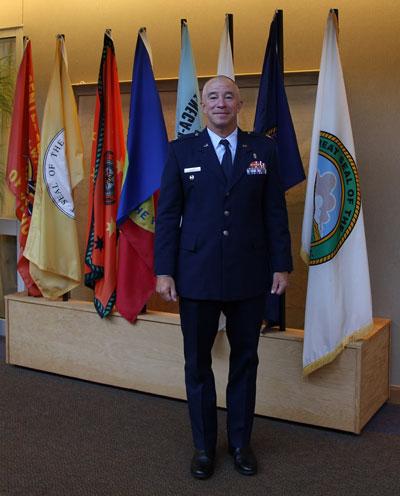
LTC Duffy on Zika Virus
Monday, November 7, 2016
Lieutenant Colonel Mark R. Duffy, DVM, MPH, DACVPM, of Cibolo, Texas, earned his DVM degree from OSU in 1994. He recently returned to Oklahoma State University’s Stillwater campus to accept a 2016 Distinguished Alumnus Award from OSU’s Center for Veterinary Health Sciences. While he was in Stillwater, he sat down with Maggie Jackson with the State Department of Health to talk about his involvement in identifying and studying the first known Zika virus outbreak, which occurred on Yap Island in Micronesia.
“Every couple of years, the Air Force will select a veterinarian who is a public health officer that has an MPH and they’ll let that veterinarian spend a couple years working with the Centers for Disease Control’s Epidemic Intelligence Service (EIS). And I was lucky enough to be selected to go with the EIS for a couple years. I was stationed for my EIS years with the Arboviral Diseases Branch in Fort Collins, Colo.
“In 2007, we got a call from a very astute physician on Yap Island,” continued Duffy. “The physician said, ‘hey, we’ve got an outbreak here. It could be dengue but our physicians just don’t feel like it is dengue because they have had some experience with Arboviruses, arthropod born viruses, mosquito born viruses in the past.’ I was able to go there and actually be the lead on the team of very accomplished scientists to investigate that outbreak.”
Duffy’s team did some PCR testing and it turned out to be a match for Zika virus.
“It was really a very nice, classical epidemiologic investigation. We characterized the illness in terms of person, place, and time. Once we determined that it was a unique virus outbreak, we did an epidemiologic study. We did a serum survey of a representative sample of the residents on the island.”
The team’s work resulted in a paper being published in the New England Journal of Medicine documenting the first Zika outbreak. Duffy made the final edits.
“My veterinary school experience was just absolutely amazing. If you understand the science, if you understand the physiology and the anatomy, you can develop your own answers to these things sometimes. That ability to think outside of the box is, I think, something that veterinarians have a tremendous advantage of in the way that they are trained.
“It’s a one health concept. Health is something that is similar whether you are talking about animals or whether you’re talking about humans. My focus while I was in vet school, and definitely in practice, was herd health. And public health is simply herd health with the herd of a different species. We’re looking at the good of the population in public health versus the good of the individual. In veterinary medicine, especially food animal production medicine, that’s very much what we do every single day so it’s a real easy transition. It’s a real easy leap to go from herd health in the veterinary world to public health in the human medicine world.”
There are 80 species of mosquitos present in Oklahoma. He offers this advice for Oklahomans concerned about Zika virus.
“I’ll take off my Zika expert hat and put on my hat as a public health officer. It’s always a great idea to keep our mosquito exposure to a minimum. Not only for Zika virus but we’ve also got West Nile virus and several other encephalidities that are transmitted by mosquitos. Not to mention it’s just not fun to get bitten by mosquitos. Wear long-sleeved clothing and wear Deet on exposed skin.”
And on being recognized as a 2016 Distinguished Alumni Award recipient, Duffy had this to say.
“It’s truly an honor. I would also like to thank Dr. Sybil Heise for her nomination. I am absolutely astounded, honored and extremely humbled to be here today.”
Lt. Col. Duffy is currently the Air Education and Training Command public health officer.
“AETC or Air Education Training Command is in charge of bringing lots of young folks into the United States Air Force, “explained Duffy. “They go through either basic military training or through a commissioned officer training and then they go on to a technical school where they learn the primary job that they’ll be doing once they get into the Air Force.”
For more information on starting a career in veterinary medicine, visit the DVM Program webpage or call (405) 744-6961.
